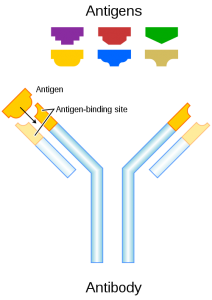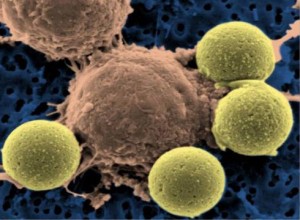
Image from University of Oslo : Professor Johanna Olweus and her research team
Today, it is estimated that 2 out of 5 Canadians develop some type of cancer during their lifetime. Cancer rates are increasing around the world and is becoming a major concern. Professor Johanna Olweus and her research team at the University of Oslo have recently come up with a new method to treat certain types of cancer. The treatment involves using immune cells from donors to attack cancers cells in the patient. They claim that this approach has potential to eradicate cancer forever.
There is no known “cure” for cancer at present, but it is managed in several different ways. Immunotherapy treatments have been quite successful for several cases. Immunotherapy for cancer usually involves introducing antibodies or performing bone marrow transplants. Antibodies are proteins produced by white blood cells that recognize specific pathogenic cells, molecules, or the infected host cells. By tagging the infected cells, antibodies allow the body’s immune system to attack only those cells and prevent further damage. However, antibody-mediated treatments are not always effective because due to its high specificity, antibody targeted against one type of cancer cell is not effective for others.
Bone marrow transplants are performed for patients with leukemia or lymphatic cancer. It involves transferring the bone marrow, which produces new blood cells, and T cells from the donor. T cells are important immune cells that, like antibodies, target specific cells and perform immune responses. Host T cells do not recognize cancer cells as foreign or harmful, however, since cancer cells are in fact host’s own cells that grow and replicate uncontrollably. The added T cells recognize cancer cells both as foreign and harmful, and act quickly to eliminate them. The treatment is effective but also very dangerous at the same time; new T cells can attack normal, uninfected cells of other intestines, causing serious damage or even death.
Professor Olweus attempts to combine the effectiveness of the transplant treatment with the accuracy of the antibody treatment. She was able to select donated T cells that targeted cells found only in specific organs. The injected T cells killed both healthy and infected target cells, preventing the tumor from spreading any further. This could be a powerful tool for people with types of cancer such as breast or liver cancer, which affect organs that people can live without, or that can be replaced with transplants. Another advantage is that T cells are more effective in detecting abnormalities in a cell. Antibodies only scan the cell surface but T cells can analyze both inside and outside of cells, providing a higher level of accuracy.
The study has promising aspects, but obviously has limitations. The method doesn’t seem to work for cancers such as lung cancer where we can’t manage to live without the organ. Most people would still prefer to live with their organs intact, and it would be ideal if only the infected cells were targeted. With further research, hopefully we will be able to overcome such limitations.
References :
http://www.wsws.org/articles/2003/apr2003/canc-a26.shtml
http://www.sciencedaily.com/releases/2012/02/120203091815.htm


